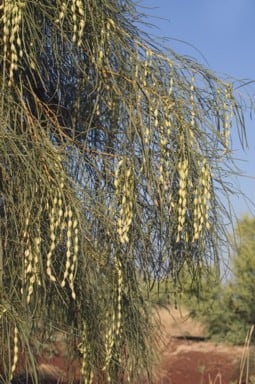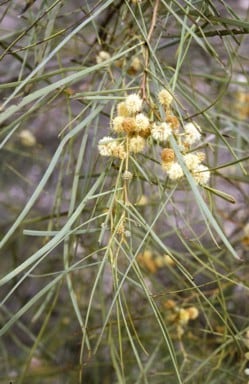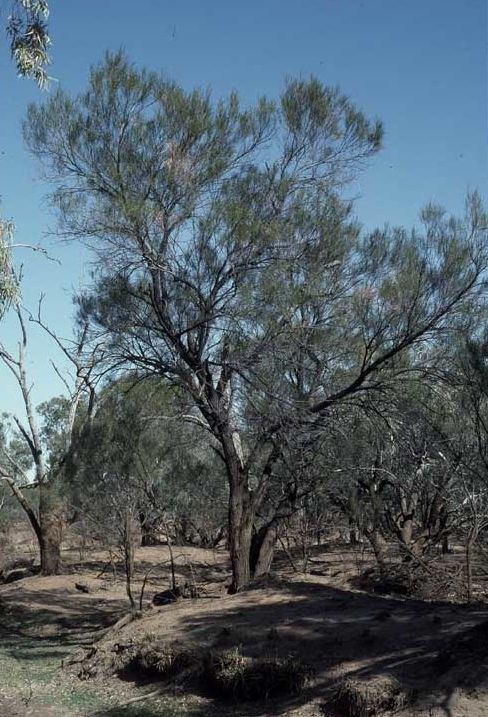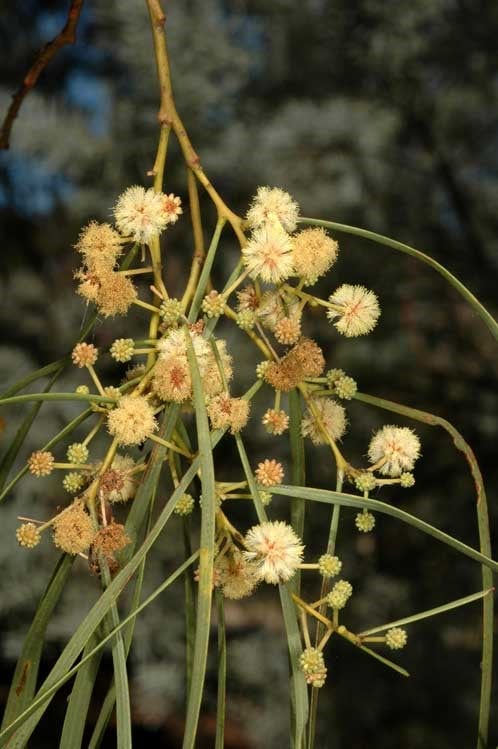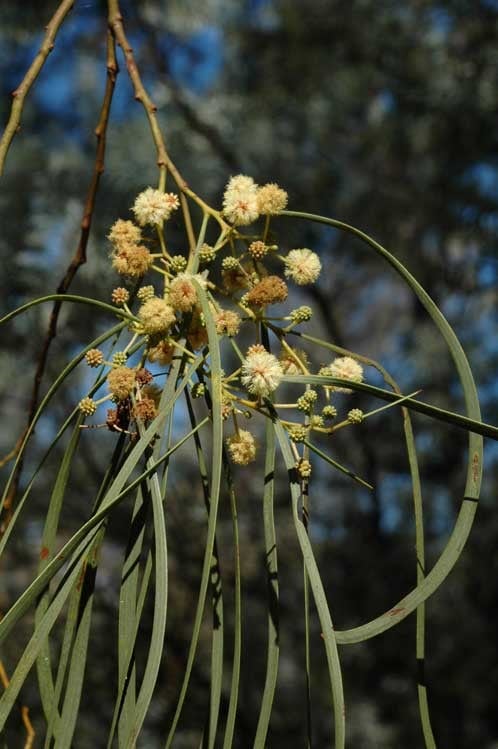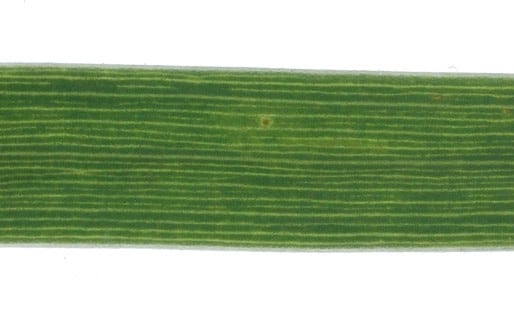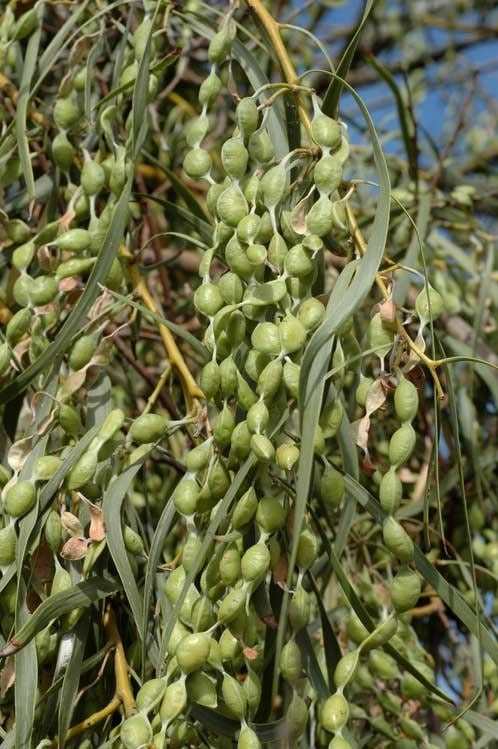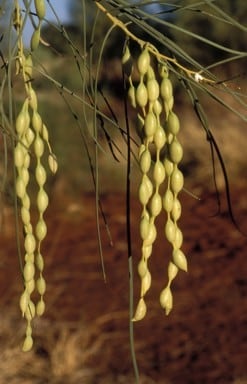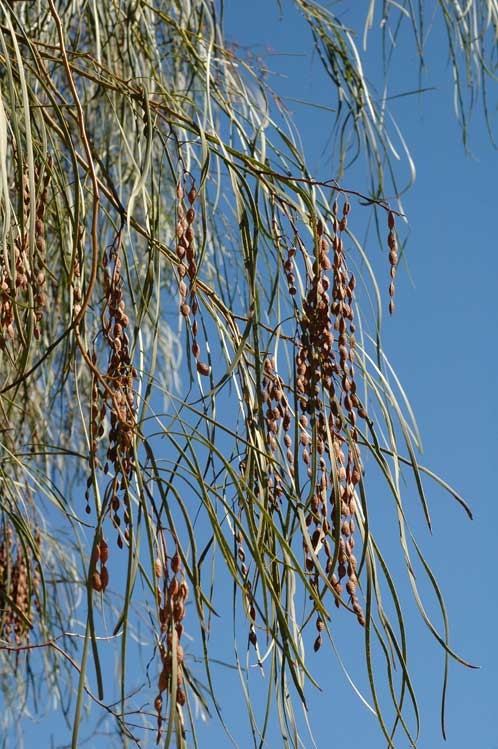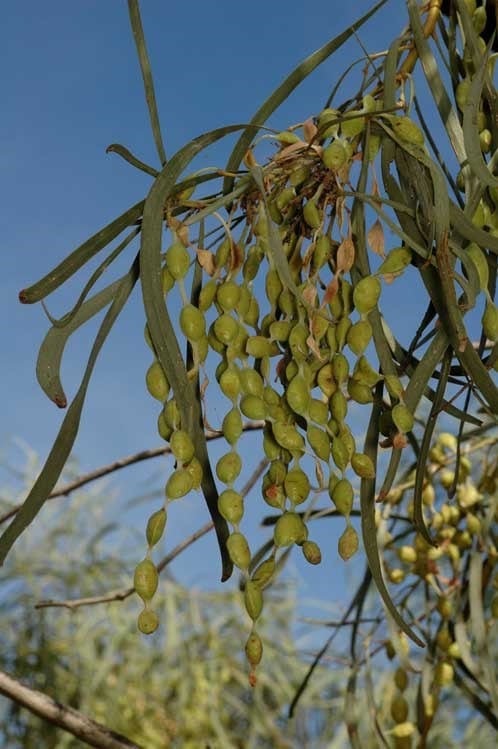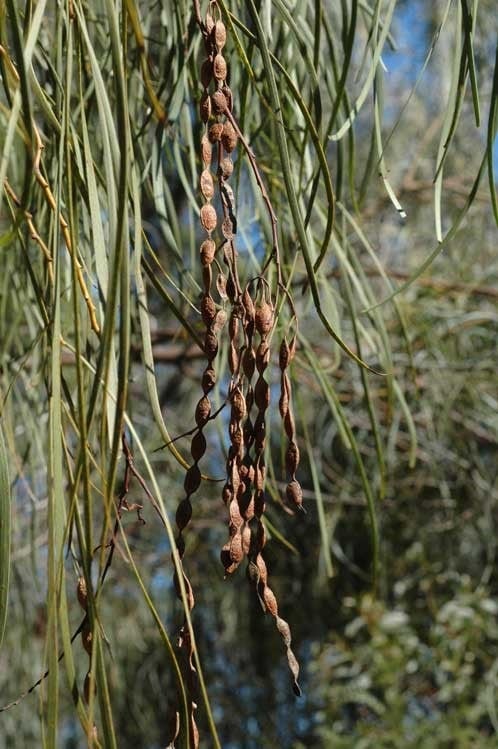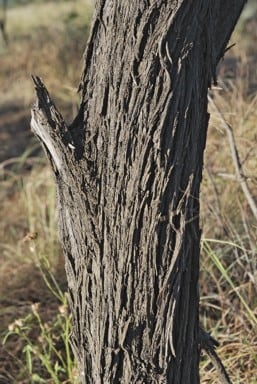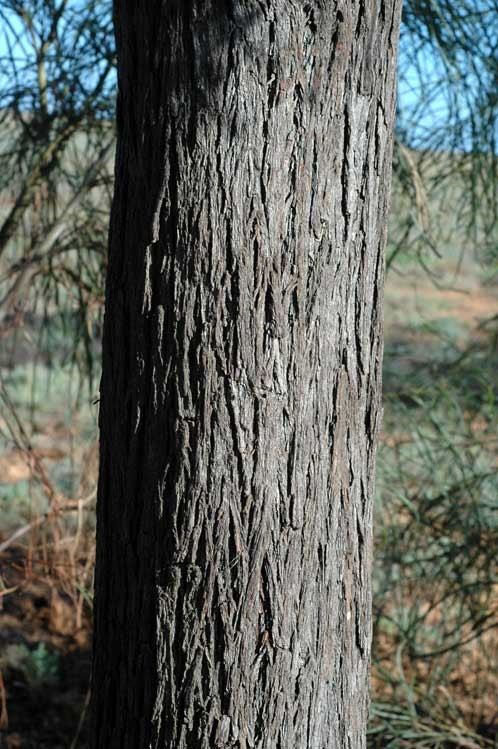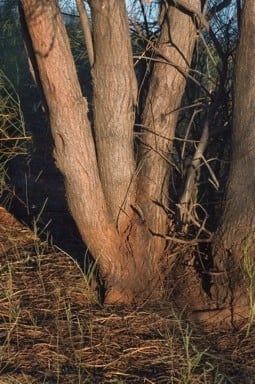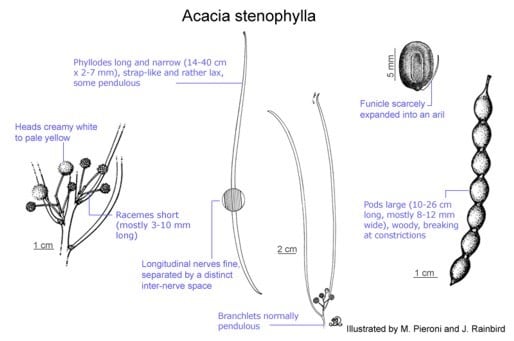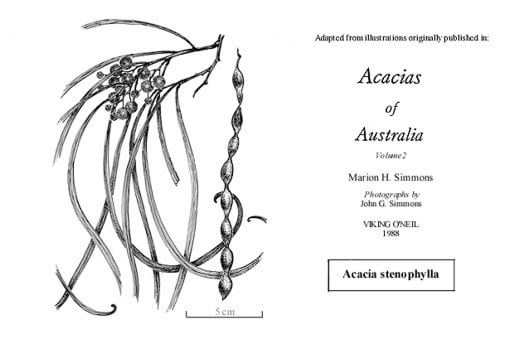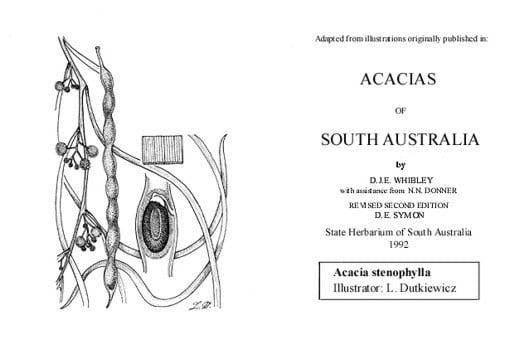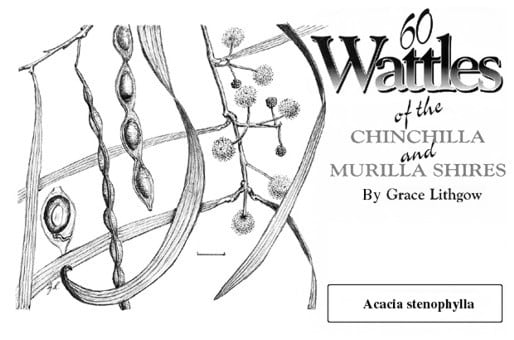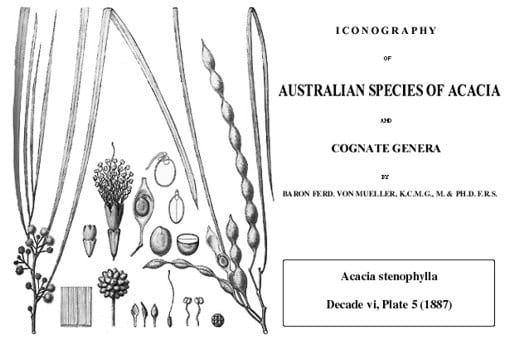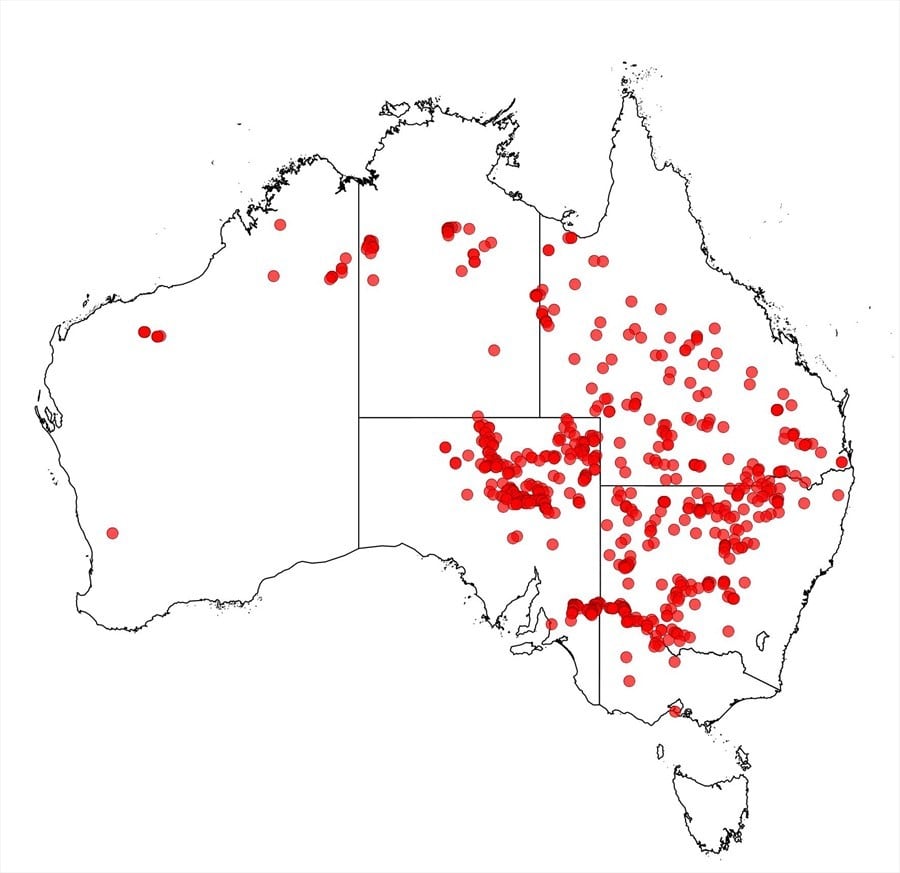Acacia stenophylla A.Cunn. ex Benth.
WATTLE
Acacias of Australia
Common Name
River Cooba (Standard Trade Name), Munumula, Balkura, Gurley, Gooralee, Ironwood, Dalby Wattle, River Myall, Belalei, Eumong, Native Willow, Black Wattle, Dunthy
Family
Fabaceae
Distribution
Very widely distributed in inland arid areas from far eastern Kimberley region of W.A. (with a disjunct occurrence in the Pilbara), E through N.T. to Qld (W of the Great Divide) and S to the Murray-Lachlan-Darling R. system in N.S.W., Vic. and S.A., disjunct in S.A. between L. Eyre and the Murray R.
Description
Somewhat bushy shrub or tree 4–20 m high, with a tendency to sucker. Bark rough, dark grey to blackish. Branchlets normally pendulous, glabrous to sericeous. Phyllodes ligulate, pendulous, 14–40 cm long, 2–7 mm wide, innocuous with an acute to acuminate, often curved apex, coriaceous, rather lax, glabrous or sparsely appressed-puberulous, with numerous subdistant nerves. Inflorescences (1-) 2–6-headed racemes; raceme axes (1-) 3–10 (-15) mm long, appressed-puberulous, rarely glabrous; peduncles (4–) 6–13 (–15) mm long, appressed-hairy or rarely glabrous; heads globular, 6–9 mm diam., (20-) 25–40-flowered, creamy white to pale yellow. Flowers 5-merous; sepals 3/4-united. Pods ±moniliform, breaking readily at constrictions, indehiscent, 10–26 cm long, (6-) 8–12 (–14) mm wide, woody, obscurely longitudinally wrinkled, glabrous. Seeds longitudinal, broadly elliptic to oblong-elliptic, 7–9 mm long, dark brown; funicle scarcely arillate.
Habitat
Usually grows in heavy soils along watercourses subject to periodic flooding where it frequently forms monospecific stands. Acacia stenophylla is a hardy, long-lived species with a moderate to fast growth rate, that coppices and has a vigorous root suckering habit. It is moderately drought- and frost-tolerant, highly salt-tolerant and is tolerant of alkalinity. It is considered a woody weed in parts of the Channel country in north-western Queensland.
Specimens
W.A.: Sturt Ck at Billiluna HS, J.H.Willis s.n. (MEL, PERTH00671967). N.T.: Stuart Hwy at Newcastle Ck, T.S.Henshall 2502 (BRI, DNA, NSW, PERTH). S.A.: Murray R., between Renmark and Chowilla Stn, 2 Sept 1982, B.R.Maslin s.n. (PERTH). Qld: 25 km NW of Headingly Stn, R.A.Perry 864 (CANB, NSW, PERTH). N.S.W.: E. bank of Gol Gol Ck, 0.5 km E. of Gol Gol, L.Thomson LXT197 (PERTH). Vic.: Wallpolla Is., 0.5 km W of Finnegan’s Bridge, G.R.Lucas 367 (MEL).
Notes
An overview of the biology, ecology and utilisation potential of A. stenophylla is provide by B.R.Maslin & M.W.McDonald, AcaciaSearch: Evaluation of Acacia as a woody crop option for southern Australia 216–220 (2004).
The long phyllodes and growth form may resemble A. coriacea subsp. pendens and A. pachycarpa. Subspecies pendens is most readily distinguished by its striate, coriaceous pods which do not break at the constrictions, conspicuous, orange seed aril, shorter racemes and more finely nerved phyllodes (without discrete inter-nerve spaces). Acacia pachycarpa is readily recognized by its spicate inflorescences, non-moniliform pods and obscurely reticulately nerved phyllodes.
FOA Reference
Data derived from Flora of Australia Volumes 11A (2001), 11B (2001) and 12 (1998), products of ABRS, ©Commonwealth of Australia
Author
B.R.Maslin
R.S.Cowan
This identification key and fact sheets are available as a mobile application:
URL: https://apps.lucidcentral.org/wattle/
© Copyright 2018. All rights reserved.
